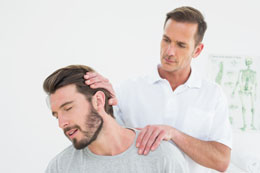Frequent headaches accompanied by a sore neck are a common problem among a large section of the population while working and sleeping. Read ahead to know more about the causes of these conditions.

Frequent or constant headaches accompanied by neck pain, often indicate some problems related to neck muscles. It is more commonly observed in people who fail to maintain a correct body posture at their workplaces. An incorrect body posture along with stress and tension has been found to culminate into severe headache and neck pain in such individuals. However, in many instances, headaches that originate from neck pain can be an indicator of some other underlying disorders and problems, as well. Here is a brief discussion about some of the major causes of headaches and neck pain, as well as a few tips for their prevention.
Chronic Headache and Pain in the Neck
Causes
As has been mentioned already, a poor body posture can result in neck pain, which in turn can cause headaches as well. This is particularly true for the individuals whose profession requires them to sit for long hours in one position, especially in front of the computer. Wrong body posture can put strain on the muscles at the back of the neck, through which, the occipital nerve passes. Strain and pressure on this nerve can be a major cause of headache that are usually accompanied by neck pain. Similarly, constantly watching television or the computer screen for a long time can strain the eye muscles and cause pain in the eyes and head.
Along with posture, stress or tension can be an important factor causing headaches. Stress is known as one of the leading causes responsible for giving rise to a number of health problems, including headaches. In addition to headaches, it can also cause neck pain and stiffness.
Another major factor is poor lighting conditions. Working or reading in poorly lit spaces can strain the muscles of the eyes and the forehead, which can result in both headaches and neck pain. However, many times, this condition is also caused by a disorder called, temporomandibular joint disorder (TMD). This is a disorder associated with both jaw and neck pain, and it can produce headache as well.
Apart from these common neck and head pain causes, some underlying diseases or disorders can also be responsible for this condition. It has been observed that constant headaches and neck stiffness can be an indicator of migraine and meningitis. Meningitis is one of the most common causes in children, along with fever. Similarly, cluster headaches have been found to cause tenderness or pain in the neck, along with headaches. Sometimes, even physical injury or trauma to the head and the neck can cause recurrent pain.
Prevention
Headache that stems from neck problems, can last for a few hours to several days. Though pain medications can alleviate the condition temporarily, they fail to address the exact causes. Therefore, prevention of this condition requires proper identification of the underlying causes. Headaches that originate from the problems of the neck or neck muscles can be relieved with appropriate neck exercises. So, if your profession requires you to sit for long hours, then make sure to take small breaks to stretch your neck and back. Stretching exercises for neck can help a great deal, but it is advisable to consult a physical therapist before practicing these.
Regular exercises would not only help to keep your body in good condition, but also to reduce the level of stress and tension. Stress and tension don't just cause headaches, but they are also known to cause many serious health conditions. Relaxation techniques like meditation can help to cope with stress and anxiety. However, the most important role in preventing these health problems can be played by posture correction. Correction of posture while sitting or sleeping can help to a great extent, to alleviate neck and head pain.
Equally important is regular exercising and management of stress and anxiety in order to deal with the problems. However, one should also consult a physician to find out the underlying causes, so that they can be addressed with the appropriate preventive measures.
Disclaimer:
This Buzzle article is for informative purposes only, and should not be used as a replacement for expert medical advice.


 Frequent or constant headaches accompanied by neck pain, often indicate some problems related to neck muscles. It is more commonly observed in people who fail to maintain a correct body posture at their workplaces. An incorrect body posture along with stress and tension has been found to culminate into severe headache and neck pain in such individuals. However, in many instances, headaches that originate from neck pain can be an indicator of some other underlying disorders and problems, as well. Here is a brief discussion about some of the major causes of headaches and neck pain, as well as a few tips for their prevention.
Frequent or constant headaches accompanied by neck pain, often indicate some problems related to neck muscles. It is more commonly observed in people who fail to maintain a correct body posture at their workplaces. An incorrect body posture along with stress and tension has been found to culminate into severe headache and neck pain in such individuals. However, in many instances, headaches that originate from neck pain can be an indicator of some other underlying disorders and problems, as well. Here is a brief discussion about some of the major causes of headaches and neck pain, as well as a few tips for their prevention.